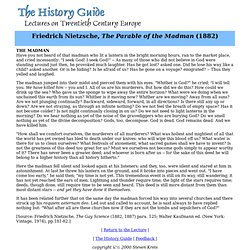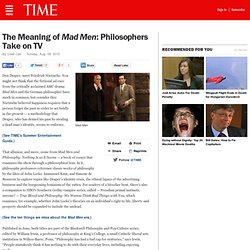

Madmencast : Happy Mothers Day! #MadMen... 560x375. Or, towards an ethics of mad(dened) men - TeleVisio. Mad Men Season 6, Episode 1 Recap. Don Draper's gonna die.

It was everyone's first thought last night, when the sixth season of Matthew Weiner's Mad Man premiered. From a first-person POV, someone dying looks up at a ceiling while a bald doctor administers blows to the chest. A heart attack? Megan Draper is screaming. Z_Cylinder24 : An Old Fashioned to commemorate... 30 Reasons Why You Love To Hate Pete Campbell. 'Mad Men' Season 6: Jon Hamm On Don's Evolution, Directing And Letting Peggy Go. "Mad Men" Season 6 premieres on April 7 (9 p.m.

ET on AMC) and though star Jon Hamm is firmly on board with creator Matthew Weiner's anti-spoiler policy, the star was still happy to sit down with press for a group interview ahead of the show's impending debut to discuss his hopes for flawed hero Don Draper, the clues that can be gleaned from the show's promotional artwork and how the losses of Peggy professionally and Lane literally will affect his character. The actor also teased that viewers have a lot to learn about TV's favorite antihero. "We find out more in Season 6 about why Don is how he is and why Don does what he does," he said.
Read on for much more! Note: Questions were asked in a roundtable format by multiple outlets and portions of the below interview have been edited or condensed for clarity. We can't talk much about this season, but the poster this year is very interesting. We’re still at it: The majority of feature films these days are pitched to 14-year olds. Do We Care whether Don Draper is an Alcoholic? On the Prevalence of Addiction Subtexts in Television Drama. In Season Four of the heralded AMC drama Mad Men, Don Draper appeared to be building toward an alcoholic crisis.

The child of alcoholics, and himself a dedicated daily drinker even by the standards of the three-martini-lunch set, Don already had endured car accidents, destructive one-night-stands, and many a shaky, sweaty, even bandaged morning after. Then, midway through last season, as he struggled to re-establish his sense of self in the aftermath of his divorce, his drinking escalated. He lost an entire weekend to a blackout, leaving a bar after his greatest professional triumph with an appropriately classy sexual trophy, but waking up two days later with a waitress who somehow knew his real name — signs of the sudden collapse of the identity he had worked so hard to build.
Does this look like a guy who can handle his liquor? This anxious course correction and subsequent drift back to the edges of self-mastery are familiar elements of a slow-surging alcoholism. Friedrich Nietzsche, "The Parable of the Madman" (1882) THE MADMAN Have you not heard of that madman who lit a lantern in the bright morning hours, ran to the market place, and cried incessantly: "I seek God!

I seek God! " -- As many of those who did not believe in God were standing around just then, he provoked much laughter. Has he got lost? Asked one. Did he lose his way like a child? The madman jumped into their midst and pierced them with his eyes. "How shall we comfort ourselves, the murderers of all murderers? Here the madman fell silent and looked again at his listeners; and they, too, were silent and stared at him in astonishment.
It has been related further that on the same day the madman forced his way into several churches and there struck up his requiem aeternam deo. [Source: Friedrich Nietzsche, The Gay Science (1882, 1887) para. 125; Walter Kaufmann ed. . | Return to the Lecture | | The History Guide | Feedback | A Self-Made Man. Retrospective on History, Part Two To follow up on my last post about Don--or Dick--re-creating himself but finding that his history keeps getting in the way: Mary Schmich wrote a column in the Chicago Tribune this past Sunday about the Chicago mayoral race, in which Gery Chico--raised in a south side working class neighborhood--has been criticizing Rahm Emmanuel, who grew up in the wealthy North Shore suburb of Wilmette.

Brian Mackey: Appreciating the ‘Mad Men’ philosophy. The Meaning of Mad Men: Philosophers Take on TV. Don Draper, meet Friedrich Nietzsche.

You might not think that the fictional ad exec from the critically acclaimed AMC drama Mad Men and the German philosopher have much in common, but consider this: Nietzsche believed happiness requires that a person forget the past in order to act boldly in the present — a methodology that Draper, who has denied his past by stealing a dead man's identity, seems to embrace. That allusion, and more, come from Mad Men and Philosophy: Nothing Is as It Seems — a book of essays that examines the show through a philosophical lens.
In it, philosophy professors reference classic works of philosophy by the likes of John Locke, Immanuel Kant, and Simone de Beauvoir to explore topics like Draper's identity crisis, the ethical lapses of the advertising business and the burgeoning feminism of the 1960s. Self-Made Mad Men. By Mad Men is a show founded on the very American idea of self-reinvention.

Like Fitzgerald and Gatsby, the show’s creator, Matt Weiner, and his main character, Don Draper, argue that we can make ourselves out to be anything or anyone. And the entire first season centered on this theme of self-reinvention: originally a lowly farm boy, neurotic Dick Whitman becomes the self-assured, Madison Avenue executive Don Draper. Yet his speckled past comes to haunt him. 'Mad Men' Gets Deep, 'The Existential Void of Roger Sterling'